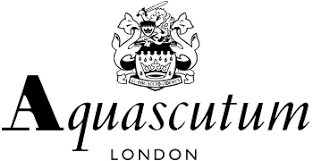Rainy Days End for Aquascutum as Hudson Weir Provides Shelter

Background

In mid-2020, Aquascutum, the British fashion brand renowned for its luxury outerwear, entered administration after struggling with financial difficulties. The 161-year-old company, with a heritage deeply embedded in British fashion, faced losses despite its long-standing history and global recognition. Founded in 1851, Aquascutum was known for its innovative trench coats and association with elite clientele, including British royalty.
The company had become loss-making, unable to navigate the increasingly competitive and changing retail landscape. Employing 250 people across the UK, Aquascutum’s business spanned three high street stores, 16 concessions, seven outlet stores, and 11 international concessions. Additionally, the brand operated a manufacturing facility in Corby, Northamptonshire.
The brand was acquired by Harold Tillman and Belinda Earl, who sought to revitalise Aquascutum and leverage its rich history. However, despite efforts to restore profitability, the business continued to suffer from declining sales and rising operational costs, leading to its eventual placement into administration.
The Administration
Hudson Weir was appointed as the administrator, with partner Hasib Howlader tasked with overseeing the process. His goal was to stabilise the business, preserve jobs, and reduce the impact on the wider brand. Hasib Howlader comments on the situation:
“We are conscious of the value of the Aquascutum brand and its long-standing heritage, and because of this, we are keen to trade the store, retain employees and help limit the losses for creditors. Our priority is to a provide a better result for employees and stakeholders involved. Hudson Weir acted swiftly to assess the company’s financial position, preventing a shut-down by trading the store, preserving jobs and returning a substantial amount to creditors.”
Challenges Faced
Aquascutum’s financial difficulties stemmed from multiple factors, including a shift in consumer preferences towards online shopping and casual fashion, high operational costs, and a lack of investment in digital transformation. Despite its international presence and strong brand recognition, the company was unable to keep pace with the changing retail environment.
Another major challenge was maintaining the Corby manufacturing base, where much of Aquascutum’s outerwear was produced. The administrators were committed to preserving as many jobs as possible, especially within this factory, which had become synonymous with the brand’s high-quality craftsmanship.
Hudson Weir worked diligently to provide updates and ensure a transparent process. Additionally, with 16 concessions, seven outlet stores, and 11 international locations, the logistical complexity of managing Aquascutum’s wide-reaching retail operations added further intricacy to the administration process.
Strategic Approach
Hudson Weir quickly initiated a marketing campaign to drive as many customers to their flagship store as possible – calling on all of its in-house marketing experience. Stakeholders were informed throughout the process.
By maintaining the brand’s operations during the administration period, Hudson Weir helped preserve the wider brand and produce a more favourable return for the creditors of the company.
Outcome
Hudson Weir successfully managed to keep the business running while keeping all stakeholders abreast of the situation – especially the creditors. Hudson Weir showcased the firm’s ability to handle a complex, multi-faceted business with international operations.
Conclusion
The administration of Aquascutum highlighted the challenges faced by heritage brands in an evolving retail landscape. Hudson Weir’s involvement was crucial in keeping the business operational . The firm’s swift and strategic approach allowed Aquascutum to continue trading, preserving its value while working towards securing a positive outcome for employees, creditors, and the brand’s future.














